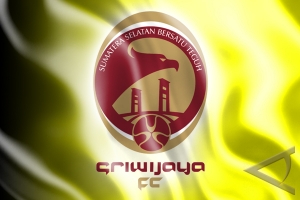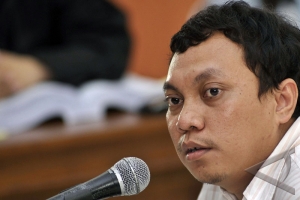
A still image taken from video footage shows protesters carrying a man purportedly shot in the head during an anti-government demonstration in Benghazi February 18, 2011. — Reuters pic

A woman leads protesters in a demonstration against the rule of Libya's leader Muammar Gaddafi in front of the White House in Washington February 19, 2011. — Reuters pic
TRIPOLI, Feb 20 — Libyan security forces shot dead dozens of protesters as they struggled to stamp out a revolt in the second city Benghazi, and Bahrain's rulers began talks with the opposition as unrest continued to sweep the Middle East.
Anti-government demonstrators in Bahrain swarmed into Pearl Square in Manama yesterday, putting riot police to flight in a striking victory for their cause and confidently setting up camp for a protracted stay.
In Libya's eastern city of Benghazi, a witness told Reuters snipers had fired at protesters from a fortified compound.
"Dozens were killed . . . not 15, dozens. We are in the midst of a massacre here," said the resident, who did not want to be named. The man said he helped take the victims to a local hospital during the violence yesterday.
The Libyan authorities have not allowed foreign journalists into the country since the protests against Gaddafi erupted, and the witness's account could not be independently verified.
Human Rights Watch says 84 people have been killed in Libya since the protests began, the death toll a reflection of the ferocity of the security crackdown mounted in response to anti-government protests that sought to emulate uprisings in neighbouring Egypt and Tunisia.
Unrest has spread from those two countries, whose leaders were toppled, to Bahrain, Libya, Yemen, Oman, Kuwait and Djibouti as people take to the streets demanding political and economic change.
Anti-government protests met varying degrees of force in Yemen, Algiers and Djibouti, while an Egyptian court approved a new party in a landmark ruling. Authorities in Saudi Arabia detained activists trying to set up the kingdom's first political party.
Sniper fire
In Libya, the violence was concentrated around Benghazi, 1,000km east of the capital, where support for Gaddafi traditionally has been weaker than in the rest of the country.
There was no sign of a nationwide revolt, but Twitter was abuzz with talk of unrest in towns other than Benghazi. Reports ranged from the use of mercenaries and aircraft to mortars and artillery against protesters, but with foreign media banned from entering the country, they were impossible to verify.
Internet service has been cut off in Libya, but local Muslim leaders called for an end to the violence.
"This is an urgent appeal from religious scholars (faqihs and Sufi sheikhs), intellectuals, and clan elders from Tripoli, Bani Walid, Zintan, Jadu, Msalata, Misrata, Zawiah, and other towns and villages of the western area of our beloved Libya to all of humanity, to all men and women of goodwill," they said in an appeal to Reuters.
The Benghazi witness told Reuters security forces had set up a 50-metre perimeter around their "command centre" and fired at anyone approaching it.
He said people were killed after protesters tried to break into the compound command. Another resident earlier said the security forces were confined to the compound.
The resident said the violence was beginning to hurt food supplies. Italy's Ansa news agency quoted an Italian witness there as saying the city was "completely out of control".
"All the government and institutional buildings and a bank have been burnt, and the rebels have ransacked and destroyed everything. There's no one on the streets, not even the police," said the witness, who declined to be identified.
The government has not released any casualty figures or made any official comment on the violence.
British Foreign Secretary William Hague urged Libya to stop using force against protesters, calling it "unacceptable and horrifying", and asked Middle Eastern governments to respond to the "legitimate aspirations" of their people.
The unrest has helped drive up oil and gold prices.
Analysts say that Gaddafi, unlike the Egyptian leadership, has oil cash to smooth over social problems, and is respected in much of the country.
Bahrain talks
In Bahrain, a key US ally and home to the US Fifth Fleet, thousands of protesters celebrated as they poured into Pearl Square after riot police pulled out.
"We don't fear death any more, let the army come and kill us to show the world what kind of savages they are," said Umm Mohammed, a teacher wearing a black abaya cloak.
Bahrain's government said it had opened a dialogue with opposition groups demanding reform. The crown prince called for a national day of mourning for the six people killed in this week's protests and appealed for calm.
He had earlier announced that all troops had been ordered off the streets — meeting one of the conditions for talks set out by a former lawmaker of the main Shi'ite opposition bloc Wefaq.
The Sunni Muslim Al-Khalifa dynasty rules Bahrain, but the Shi'ite majority has long complained about what it sees as discrimination in access to state jobs, housing and health care.
The United States and top oil producer Saudi Arabia see Bahrain as a bulwark against neighbouring Shi'ite Iran.
In Egypt, a court approved the Wasat Party (Centre Party), the first new party to be recognised since President Hosni Mubarak was overthrown this month, and an official said there would soon be a limited cabinet reshuffle.
In Yemen, one protester was killed and seven were hurt in clashes with supporters of President Ali Abdullah Saleh in Sanaa.
Riot police in Algiers meanwhile prevented some 500 protesters marching in through the city centre.
The uprisings sweeping through the region also reached the tiny Horn of Africa state of Djibouti, where three leading opposition politicians were detained yesterday in a move to quash anti-government protests.
Djibouti, a former French colony between Eritrea and Somalia, hosts France's largest military base in Africa and a major US base. Its port is used by foreign navies patrolling busy shipping lanes off the coast of Somalia to fight piracy. Unemployment runs at about 60 per cent. — Reuters





